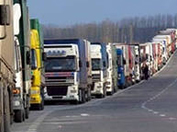Latvian Border Guard has come up with a way to combat queues at the border
 In the nearest future the Latvian Border Guard plans to unload the border for those who travel by tightening control over vehicles with non-standard or converted fuel tanks. This is due to the fact that recently there have been more and more cases of border zone residents crossing the border to import the allowed amount of fuel.
In the nearest future the Latvian Border Guard plans to unload the border for those who travel by tightening control over vehicles with non-standard or converted fuel tanks. This is due to the fact that recently there have been more and more cases of border zone residents crossing the border to import the allowed amount of fuel.
Increased checking of vehicles will help reduce the flow of cars and eliminate queues that at the checkpoints "Grebnevo" and "Terekhovo" at the beginning of the summer season began to appear very quickly. This was reported to a REGNUM IA correspondent on June 15 by Gunta Skrebele, a representative of the Ministry of Internal Affairs.
As a result of the inspection, vehicles suspected of possible fuel smuggling will be sent for a full inspection. In addition, at the request of border guards, individuals who regularly enter Latvia will be checked separately. All these measures, according to Gunta Skrebele, will help the State Border Guard Service to unload the load on the Latvian-Russian border.
The reason for such measures have become regular queues at the border and the discovery of the fact that about 70% of car owners are residents of border zones of Latvia, who enjoy the right to bring into the country the allowed amount of fuel without violating the law on excise duty. Besides, Skrebele believes that the queues have grown because of the increased number of passenger cars bought in the European Union, which are also subject to customs inspection.
In order to establish a normal mode of operation of the border zone, the State Border Guard Service proposes to establish a permissible regularity of fuel import with a frequency of once a week, instead of once a day, as it happens under the current law on excise duty. By the way, a similar practice has already been introduced in Latvia, where fuel can be brought into the country no more than five times a month. Otherwise, the owner is charged a tax on the imported fuel for each subsequent import.

 EN
EN PL
PL EE
EE








